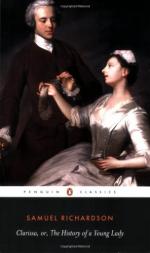Adultery is so capital a guilt, that even rakes and libertines, if not wholly abandoned, and as I may say, invited by a woman’s levity, disavow and condemn it: but here, in a state of keeping, a woman is in no danger of incurring (legally, at least) that guilt; and you yourself have broken through and overthrown in her all the fences and boundaries of moral honesty, and the modesty and reserves of her sex: And what tie shall hold her against inclination, or interest? And what shall deter an attempter?
While a husband has this security from legal sanctions, that if his wife be detected in a criminal conversation with a man of fortune, (the most likely by bribes to seduce her,) he may recover very great damages, and procure a divorce besides: which, to say nothing of the ignominy, is a consideration that must have some force upon both parties. And a wife must be vicious indeed, and a reflection upon a man’s own choice, who, for the sake of change, and where there are no qualities to seduce, nor affluence to corrupt, will run so many hazards to injure her husband in the tenderest of all points.
But there are difficulties in procuring a divorce—[and so there ought]— and none, says the rake, in parting with a mistress whenever you suspect her; or whenever you are weary of her, and have a mind to change her for another.
But must not the man be a brute indeed, who can cast off a woman whom he has seduced, [if he take her from the town, that’s another thing,] without some flagrant reason; something that will better justify him to himself, as well as to her, and to the world, than mere power and novelty?
But I don’t see, if we judge by fact, and by the practice of all we have been acquainted with of the keeping-class, that we know how to part with them when we have them.
That we know we can if we will, is all we have for it: and this leads us to bear many things from a mistress, which we would not from a wife. But, if we are good-natured and humane: if the woman has art: [and what woman wants it, who has fallen by art? and to whose precarious situation art is so necessary?] if you have given her the credit of being called by your name: if you have a settled place of abode, and have received and paid visits in her company, as your wife: if she has brought you children —you will allow that these are strong obligations upon you in the world’s eye, as well as to your own heart, against tearing yourself from such close connections. She will stick to you as your skin: and it will be next to flaying yourself to cast her off.
Even if there be cause for it, by infidelity, she will have managed ill, if she have not her defenders. Nor did I ever know a cause or a person so bad, as to want advocates, either from ill-will to the one, or pity to the other: and you will then be thought a hard-hearted miscreant: and even were she to go off without credit to herself, she will leave you as little; especially with all those whose good opinion a man would wish to cultivate.




